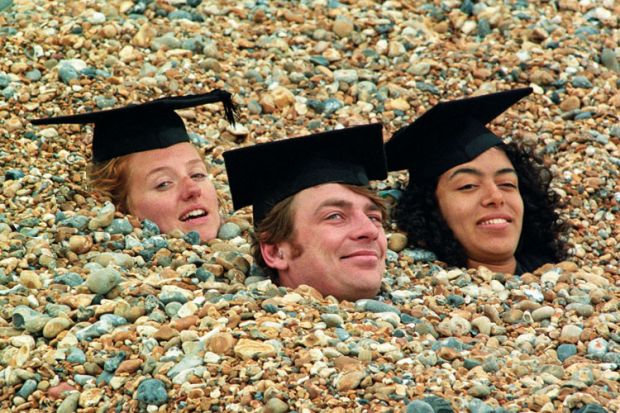Does my head look big in this?
Our Head of Graduation Ceremonies, Mr T. G. Barnum, has expressed concern about a number of “pirate” academic dress suppliers that have recently been canvassing business from Poppleton graduands who will be attending one or other of our forthcoming graduation ceremonies.
Mr Barnum warns that graduands will not be admitted to the Grand Hall on their graduation day if they are “gowned” in academic dress supplied by any of the following unaccredited companies:
Grede and Grabalot
Speed and Getaway
Smash and Grabcroft
Not one of these companies, said Mr Barnum, had “anything at all in common” with our own esteemed suppliers, Ede & Ravenscroft, who enjoyed “an unrivalled reputation” for their readiness to hire out academic dress to several hundred thousand cash-strapped students at the “relatively nominal” fee of £50 for a whole two-hour rental. He hoped that this now clarified the situation.
Look who’s talking
One of our leading experimental psychologists, Dr T. Mays, has cast doubt on the suggestion by Mark Fisher, lecturer in visual cultures at Goldsmiths, University of London, that the “real goal” of “neoliberal managerialism” in universities is to stop academics “talking to each other”.
In an article shortly to be published in The British Journal of Personal Advancement, Dr Mays describes a study in which all four contemporary Poppleton senior common rooms were subjected to intensive audio monitoring.
Subsequent analysis revealed that far from “neoliberal managerialism” inhibiting talk, it played an essential role in its promotion. Mays divides such talk into three major conversational categories:
- Extended jokes about the number of managers required to change a light bulb
- Detailed anatomical references to the best storage space for the latest communication from the Admin Block
- Vigorous exchanges of ideas about the best method for eviscerating the Head of Student Experience.
In his conclusion, Dr Mays notes that this evidence of extended talking provides a vivid empirical contrast to an observational study of SCRs in the “pre-neoliberal managerialist” times of the early 1970s, which revealed that the customary senior common room silence was broken only by occasional gurgles of satisfaction and deep sighs of contentment.

Some of my best friends
“A most inappropriate word.”
That was how Professor Gordon Lapping, of the Department of Media and Cultural Studies, responded to the suggestion in a new Higher Education Academy report that relationships between external examiners and universities were “cosy”.
Lapping admitted that his own department’s current external examiner, Dr J. K. “Ginger” Fellowes, had been a former student of his, but said this in no way made the relationship “cosy”. Indeed, he had frequently argued with “Ginger” over the choice of claret at the external examiner’s dinner.
He also revealed that he routinely found himself “at odds” with “Ginger” over the latter’s occasional unreadiness to allocate first-class degrees to more than three-quarters of the department’s finalists. He was glad to say that such disputes were eventually settled in the students’ favour after rigorous recourse to the tried-and-trusted methodology of “a nod and a wink”.
Thought for the week
(contributed by Jennifer Doubleday, Head of Personal Development)
I very much regret that the Personal Development Office is closed for the vacation. If you are suffering from depression, do try to look on the bright side.
Register to continue
Why register?
- Registration is free and only takes a moment
- Once registered, you can read 3 articles a month
- Sign up for our newsletter
Subscribe
Or subscribe for unlimited access to:
- Unlimited access to news, views, insights & reviews
- Digital editions
- Digital access to THE’s university and college rankings analysis
Already registered or a current subscriber? Login
